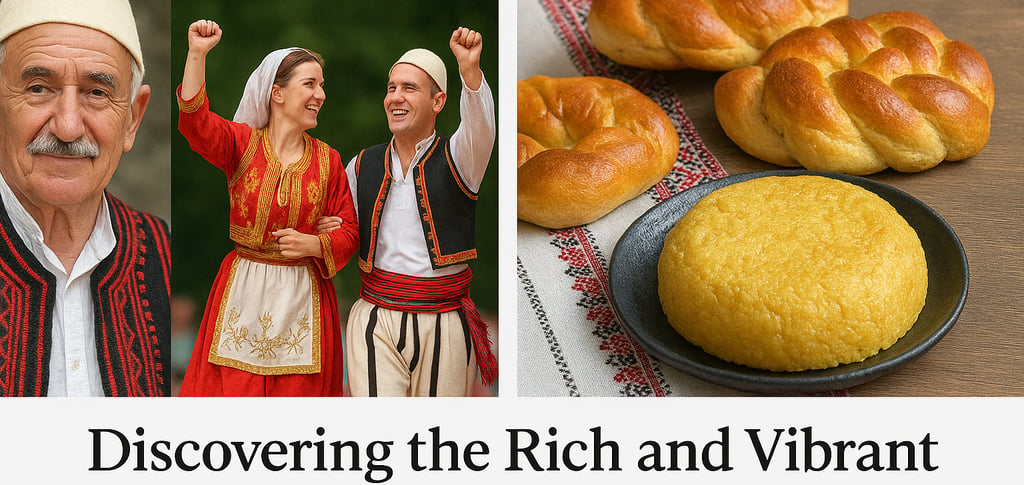Discovering the Rich and Vibrant Culture of Albania
Nestled in the heart of the Balkans, Albania is a country that captivates visitors with its breathtaking landscapes, ancient ruins, warm hospitality, and deeply rooted cultural traditions.
CULTURE
8/5/20252 min read


Nestled in the heart of the Balkans, Albania is a country that captivates visitors with its breathtaking landscapes, ancient ruins, warm hospitality, and deeply rooted cultural traditions. Though small in size, Albania boasts a rich tapestry of history, folklore, music, and customs that reflect its unique identity shaped over centuries of influence from the Greeks, Romans, Byzantines, Ottomans, and more. Let’s explore the fascinating culture of Albania and what makes it so distinctive.
1. A Deep Sense of Hospitality – "Besa"
One of the most cherished values in Albanian culture is besa, a code of honor and hospitality that signifies a sacred promise and trust. Albanians take pride in treating guests like family, offering food, shelter, and assistance without expecting anything in return. This tradition is rooted in the belief that hosting a guest is both a privilege and a duty.
2. Traditional Music and Dance
Albanian music is as diverse as its regions. From the polyphonic singing of the south, recognized by UNESCO as a Masterpiece of the Oral and Intangible Heritage of Humanity, to the lively northern folk songs accompanied by instruments like the çifteli and lahuta, music plays a central role in social gatherings and celebrations. Traditional dances, such as the vallja e tropojës or vallja e pogonit, often feature intricate footwork, symbolic gestures, and colorful costumes.
3. Festivals and Celebrations
Albania is home to a number of unique festivals that blend pagan, Christian, and Muslim traditions. Events like Dita e Verës (Summer Day) in Elbasan celebrate the arrival of spring with dancing, sweets like ballokume, and festive parades. Religious tolerance is a hallmark of Albanian culture, where Muslims, Christians, and Bektashis have coexisted peacefully for centuries, often celebrating each other's holidays.
4. Cuisine Full of Flavor and Heart
Albanian cuisine is a reflection of its geography and history—rich in Mediterranean flavors, locally grown produce, and home-cooked warmth. Dishes such as byrek (savory pie), tavë kosi (baked lamb with yogurt), and fërgesë (a hearty pepper and cheese dish) are staples in Albanian households. Meals are often shared with extended family, reinforcing the importance of togetherness and tradition.
5. Language and Identity
The Albanian language, Shqip, is one of the oldest in Europe and stands alone in its own branch of the Indo-European language family. It is a strong marker of national identity, and despite centuries of foreign rule, the language has survived and thrived. Albania is also known for its strong national pride, rooted in its independence, resilience, and cultural heritage.
6. Architecture and Heritage
Albania's architecture is a testament to its layered history. From the Ottoman-era bazaars of Gjirokastër and Berat (both UNESCO World Heritage Sites) to the bunkers scattered across the countryside, each tells a piece of Albania’s story. The revival of traditional crafts like stonework, wood carving, and embroidery is also keeping cultural heritage alive for future generations.
Final Thoughts
Albania is more than its beautiful beaches and majestic mountains—it is a living mosaic of traditions, values, and expressions that continue to thrive despite the winds of change. Whether you're strolling through a cobbled village, sharing a meal with a local family, or dancing at a wedding, the culture of Albania invites you in and leaves a lasting impression on your heart.
Explore
Discover Albania through local experiences and insights.
Connect
Engage
info@albaniabylocals.com
© 2025. All rights reserved.
